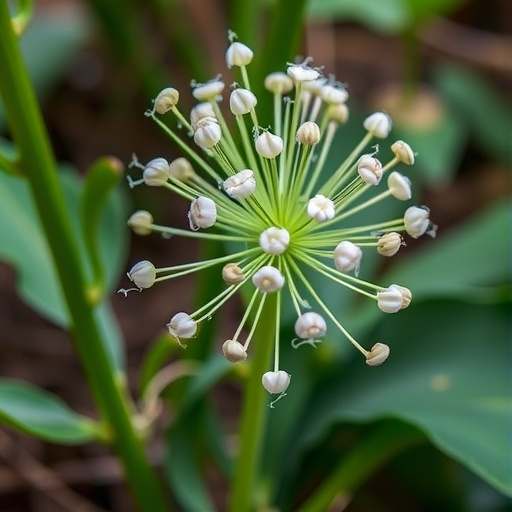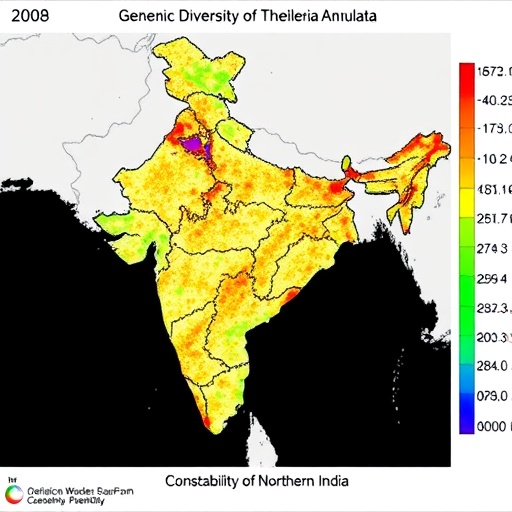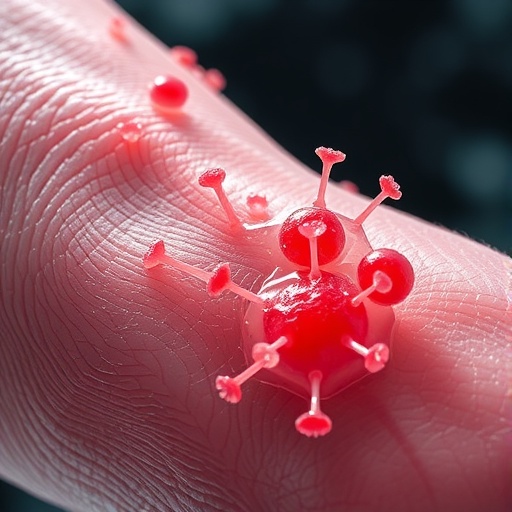
In a groundbreaking study published in Acta Parasitologica, researchers have unveiled the promising therapeutic potential of Allium tuncelianum extract against Blastocystis subtype 3 infections in laboratory rats. As parasitic infections persist as a major global health challenge, particularly in underserved populations, this insightful research offers a beacon of hope by integrating traditional botanical knowledge with modern parasitological science. This article delves into the scientific nuances of the investigation, providing a comprehensive exploration of Allium tuncelianum’s bioactive compounds, its mechanisms of action, and the implications of these findings for future antiparasitic drug development.
Blastocystis species, particularly subtype 3, represent one of the most commonly identified protist parasites in the human gastrointestinal tract. The pathogen is notorious for its ambiguous pathogenicity and resistance to conventional treatments, often resulting in chronic gastrointestinal discomfort and malabsorption syndromes. Despite its prevalence, therapeutic options remain limited, with resistance and side-effects challenging clinical management. Against this backdrop, Allium tuncelianum, a wild relative of the well-known garlic species endemic to specific regions in Turkey, emerges as a natural candidate deserving rigorous scientific scrutiny due to its unique phytochemical profile.
The recent study meticulously examined the in vivo effects of Allium tuncelianum extract on rats experimentally infected with Blastocystis subtype 3. By utilizing a controlled infection model, the research team aimed to systematically evaluate whether administration of the extract could modulate parasitic load and associated inflammatory responses. The extract was prepared through advanced solvent extraction techniques that preserve its bioactive sulfur-containing compounds, flavonoids, and polyphenols, all of which are hypothesized to exert potent antiparasitic and immunomodulatory effects.
Biochemical analyses revealed that treatment with Allium tuncelianum extract significantly reduced the Blastocystis burden in the infected rats, as indicated by extensive stool sample examinations across treatment timelines. This reduction correlated with a measurable attenuation of intestinal mucosal inflammation, implicating the extract’s dual role in both eradicating the parasite and ameliorating host tissue damage. Histopathological examinations highlighted notable restoration of villus architecture and suppression of inflammatory cell infiltration, results that underscore the extract’s therapeutic synergy between antiparasitic activity and mucosal healing.
At the molecular level, the research explored modulation of cytokine profiles in the gut mucosa, illuminating that Allium tuncelianum extract downregulated pro-inflammatory mediators such as TNF-α and IL-6, while concurrently upregulating anti-inflammatory cytokines like IL-10. This immunoregulatory shift is critical because chronic Blastocystis infections exacerbate gut inflammation through imbalanced cytokine production, and restoring homeostasis is pivotal for symptom resolution and tissue integrity. These findings situate Allium tuncelianum as a compelling natural immunomodulator with clinical implications extending beyond parasitology toward broader inflammatory disorders.
The unique phytochemical constituents of Allium tuncelianum merit particular mention. Unlike cultivated garlic, this wild species boasts elevated concentrations of S-allyl cysteine and various organosulfur compounds that have been extensively documented for their antimicrobial properties. By harnessing these molecules, the extract exhibits multi-targeted actions including disruption of parasitic membrane integrity, inhibition of metabolic enzymes crucial for parasite survival, and impeding replication machinery. Coupled with potent antioxidant capacity, these mechanisms synergistically contribute to curbing parasite proliferation while protecting host tissues from oxidative stress.
Furthermore, the study compared the efficacy of Allium tuncelianum extract against metronidazole, the current gold standard for Blastocystis treatment. Remarkably, the extract demonstrated comparable parasitic reduction rates but with markedly fewer adverse effects typically associated with conventional pharmacotherapy. This discovery opens new avenues for developing safer phytotherapeutics that could circumvent issues of drug resistance and treatment intolerance, thereby enhancing patient compliance and therapeutic outcomes.
The importance of this research is magnified when contextualized within the broader One Health perspective. Parasitic zoonoses like Blastocystis infections entail intricate interactions between wildlife, domestic animals, and humans. The integration of botanical antimicrobials sourced from endemic plants such as Allium tuncelianum contributes to sustainable bioresource utilization, offering eco-friendly alternatives to synthetic drugs. Moreover, it underscores the untapped potential of ethnobotanical knowledge, advocating for greater investment in exploring regional flora as reservoirs of novel pharmacologically active compounds.
From a technical standpoint, the researchers employed cutting-edge parasitological methods, including quantitative PCR for parasite quantification and advanced immunohistochemistry to localize specific inflammatory markers within tissue samples. The rigor of these approaches ensured high data fidelity and facilitated nuanced interpretation of parasitological and immunological dynamics post-treatment. This methodological rigor, combined with robust statistical analyses, lends strong credibility to the therapeutic claims posited in the study.
This report also sheds light on the pharmacokinetics and bioavailability aspects of Allium tuncelianum extracts. Initial pharmacodynamic profiling revealed that the bioactive constituents are absorbed efficiently when administered orally, achieving therapeutically relevant plasma concentrations without eliciting toxicity. This is of paramount importance when considering future translational steps toward human clinical trials, as optimizing dosage regimens that maximize efficacy and minimize side effects remains a cornerstone of drug development.
Additionally, the research offers fascinating insights into how Allium tuncelianum extract may influence the gut microbiota composition. Although the current study focused primarily on parasitic infections, preliminary metagenomic data hint at a modulatory effect on commensal bacterial populations, promoting beneficial taxa that support gut homeostasis. This microbiome-modulating property further differentiates the extract from conventional antiparasitic drugs, potentially endowing it with multidimensional therapeutic benefits, including enhanced barrier function and systemic immune enhancement.
Looking ahead, the study advocates for expanded investigations incorporating diverse Blastocystis subtypes, as genetic variability in the parasite population could influence treatment responsiveness. Moreover, scaling the research to include larger animal models or preliminary human trials would be critical steps to validate efficacy and safety profiles beyond the confines of rodent models. Such translational efforts will be instrumental in bridging the gap between bench research and clinical application, ultimately benefiting patients worldwide.
In summary, this landmark study illuminates the multifaceted therapeutic potential of Allium tuncelianum extract as a natural antiparasitic agent with strong immunomodulatory properties against Blastocystis subtype 3 infection. By harnessing the power of endemic botanical resources coupled with rigorous scientific validation, these findings lay the groundwork for innovative treatment strategies that transcend conventional pharmaceutical paradigms. The fusion of traditional knowledge and modern science embodied in this research not only advances parasitology but also inspires a broader reconsideration of plant-based therapeutics in combating infectious diseases globally.
With mounting evidence supporting eco-friendly, plant-derived medicinal solutions, Allium tuncelianum extract positions itself at the forefront of next-generation antiparasitic agents. Its demonstrated efficacy, combined with a favorable safety profile and potential gut microbiome benefits, underscores its candidacy for further development. Such integrative research heralds a new era where resilient natural products could alleviate the global burden of parasitic infections, enhancing health outcomes while respecting environmental and cultural sustainability.
This pioneering work serves as a clarion call for the scientific community to deepen exploration into the pharmacological treasures harbored within endemic plant species. Embracing interdisciplinary approaches and fostering collaborative efforts between ethnobotanists, parasitologists, pharmacologists, and clinicians will be vital to unlocking these natural remedies’ full potential. As researchers continue to unravel the intricate molecular dialogues between host, parasite, and therapeutic agents, Allium tuncelianum stands as a compelling exemplar of nature’s untapped medicinal arsenal.
Subject of Research: Therapeutic evaluation of Allium tuncelianum extract in treating Blastocystis subtype 3 infections in a rat model.
Article Title: Assessment of the Therapeutic Role of Allium tuncelianum Extract in Rats Infected with Blastocystis Subtype 3.
Article References:
Aykur, M., Gökşen Tosun, N. & Özgür, A. Assessment of the Therapeutic Role of Allium tuncelianum Extract in Rats Infected with Blastocystis Subtype 3. Acta Parasit. 70, 188 (2025). https://doi.org/10.1007/s11686-025-01130-y
Image Credits: AI Generated
Tags: Allium tuncelianum extractbioactive compounds in plantsBlastocystis subtype 3 infectionschronic gastrointestinal discomfortgastrointestinal tract parasiteslaboratory rat model for parasitology researchnatural antiparasitic drug developmentparasitic infections global healthphytochemical profile of Allium speciesresistance to conventional treatmentstherapeutic potential of herbal remediestraditional botanical knowledge in science




